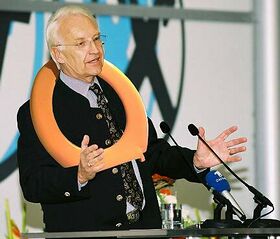Engrish

|
Höre dir den Artikel an → |
Engrish is word for English language in Asia or Asians. You see Engrish in videogames or on signs of public traffic. Even at manuals.
Warum dieser Artikel witzig ist?
Weil der Engländer glaubt, die Asiaten könnten kein L aussprechen und würden stattdessen immer R sagen, während wir Deutschen ja nun mal wissen, dass es umgekehrt ist.
Die Wahrheit hinter dem Ganzen ist natürlich, dass der Engländer selber kein R aussprechen kann, sondern allenfalls einen Laut, der an ein halbverschlucktes Kaugummi erinnert und in der zivilisierten Welt nicht als Konsonant anerkannt ist.
Entwicklung[Bearbeiten | Quelltext bearbeiten]
Engrish creates by Asians which save time likely. Because translation often with gravity, they do it at fast as they can. Faults don't matter in this case, because money is time. So you can release perhaps videogames of Japan very fast in America and other lands and this is making how much money. Or you can see signs in public traffic on which you see Engrish. This is because small, tiny eyes of Asians don't see the faults on it and don't care.
Also, Engrish finds in manuals of things Asians made. As you already might have could noticed, many faults are in this things of made Asians. But if they made manuals in bad English, no one is going to notice the life threatening faults by now. But since some humans died because of bad English manuals, many many of them sold and many many money made and many many Asians rich (very rich!).
Eigenschaften[Bearbeiten | Quelltext bearbeiten]
If you write Engrish, important is to bee left some words as possible. Or you can take words don't fit in sentence or don't exist. The order of words in sentence is can not in row humans expect. Also you can leave any words need to be in place. Faults of forthografy are too wellcome. Fantasy in making doens't existing words is possible and seen likely.
And you can see some likely letters are looking at L and R be not there should be and mixed up.
Beispiele[Bearbeiten | Quelltext bearbeiten]
You are likely to see any examples made here and to see:
| Sprache |
|
Sprachen: Jidisz | Engrish | Gebärdensprache | Googlisch | Hebräisch | Kindersprache | Latein | Polnisz | Russisch Dialekte: Amtsdeutsch | Berlina Schnauze | Ruhrdeutsch | Volksmund Grammatikalische Formen: Doppelpunkt | Dummperativ | Genitiv | Imperativ | Lautrückverschiebung | Rechtschreibung | Schlechtschreibung | Semikolon Rhetorik: Rhetorik | Dummsprech | Lückenfüller | Anglizismus | Aphorismus | Neusportdeutsche Bedeutungsverschiebung | Schachtelsatz | Palindrom | Polnische Umkehrung | Übertreibungsnorm | Guidologismus | Wort mit Migrationshintergrund Herausragende Persönlichkeiten: Günther Oettinger | Edmund Stoiber | Otto Graf Fischen Sonstiges: Durchhalteparole | Reflektive Logik | Steghalenie | Protoletrophobie |





